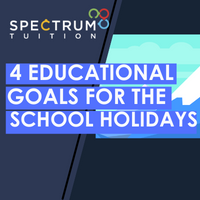When school holidays finish and students shuffle back to the classroom, there are always three distinct types of students…
The first type of student is those who have spent all of their holidays staying up late, sleeping through out the day, playing 10 hours of video games each day and forgetting everything they learned in the previous year. These students don’t know how to cope with the sudden challenges of the school year and usually take the first term just to get back into the rhythm.
The second type includes those who have spent all of their holidays being drilled on maths problems, writing practice essays, attending language and music lessons and gazing blankly into textbooks with no time for relaxation. These students are already exhausted, and are not likely to start the school year with any great enthusiasm. If you are the second type of student, you may want to look into working on your comfort factor to help you relax better after school or doing homework. Maybe starting with something as simple as switching your old purple mattress to a new one or a different type of mattress. This may improve your need to relax.
The third type of student is the best. These are the ones who have had a relaxing holiday. They have seen friends, got fresh air, watched movies and played games. But they have also read lots, revised their skills, developed good habits, set goals and are prepared for the year ahead.
The key here is finding the balance. School holidays should be about relaxation, but they are also a great time for your child to establish good habits, in a low-pressure environment, that will help them throughout the year. As such, I recommend that all students should set the following 4 goals for the Christmas holidays, to ensure that their summer break is both refreshing and productive.
1. Read Lots
Reading is a wonderful thing. On one hand, it is one of the most effective ways that students can improve their vocabulary, comprehension, analytical, spelling and grammar skills, as well as their general knowledge. On the other hand, it can also be one of the most enjoyable activities to do on a lazy summer’s day. If your child is not already passionate about reading, then now is the time to get them hooked. They can read anything and everything: fantasy novels, science fiction novels, adventure novels, picture books, autobiographies, poetry, choose-your-own-adventure books, newspapers, magazines or non-fiction books. The important thing is to find something that interests your child. A trip to your local library is a great way to start the holidays on the right foot.
2. Master Your Times Tables
It’s amazing how many students struggle with their times tables, not just in primary school but even in the later years of high school! And yet, the ability to quickly answer single-digit multiplication questions is a skill that will help them throughout their education. Even in VCE, when students rely heavily on calculators, complete intuitive mastery of the times tables can give your child that little extra edge in answering complex questions quicker and more efficiently. The good news is that you can easily make a game of the times tables during the holidays. Maybe each week you can hold a times tables competition between siblings, or encourage your child to beat their previous records. The winner can be rewarded with the choice of movie, dinner or game for that night. The more you turn it into a fun, rewarding and competitive game, the more likely it is that your child will be engaged.
3. Use A Diary
The ability to use a diary or calendar effectively is one of the most important skills that a student needs to succeed in their education. Effective diary usage is key to your child being able to plan and organise their study schedule, keep track of homework and complete assignments on time. However, diary usage is also one of the most often neglected skills. The summer holidays can often be a good, low pressure time to develop this skill. Why not buy your child a 2014 diary and encourage them to start recording important dates and events (sleeping over with friends, family holidays, Christmas parties, days at the beach). Encourage your child to remind you how long it is until these events and to use their diary to plan their holiday activities. The holidays are a great time to develop these skills, as your child will have so much fun looking ahead and planning all the fun events and activities for their summer break, they won’t even know that they’re learning a valuable life skill.
4. Be Creative
In my previous blog post, I spoke about how being “smart” is not the only factor that contributes to academic success. In fact, what we call “smart” is actually a combination of many different qualities, such as dedication, flexibility, organisation, curiosity and creativity. The latter quality, creativity, is something that your child should be developing over the summer break. Whether they are drawing, painting, shooting home movies, making Christmas gifts, writing stories, making animations on their computer or playing music, creative activities will expand your child’s imagination and allow them to look at the world from a number of different critical perspectives. The great thing is that children of all ages love to be creative! All you have to do is provide them with the necessary resources, encouragement and positive feedback, and soon, without knowing it, your child will be developing important imaginative skills that will help them throughout their education.
[fblike url=”facebook.com/spectrumtuition” style=”standard” showfaces=”false” width=”450″ verb=”like” font=”arial”]
[twitter_follow username=”spectrumtuition” language=”en”]


